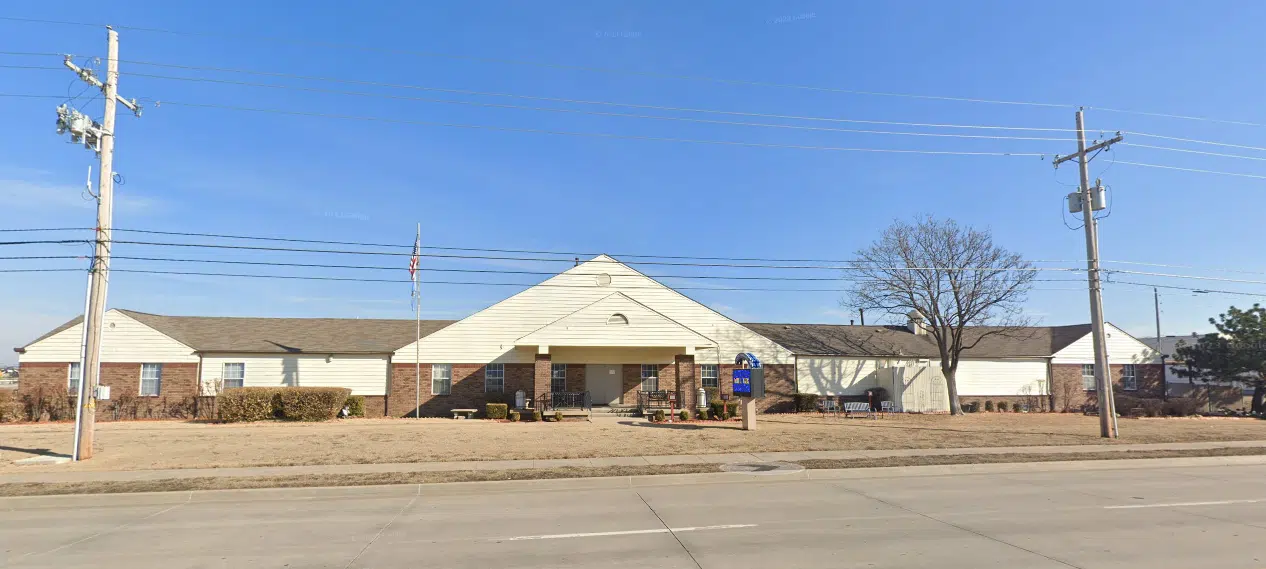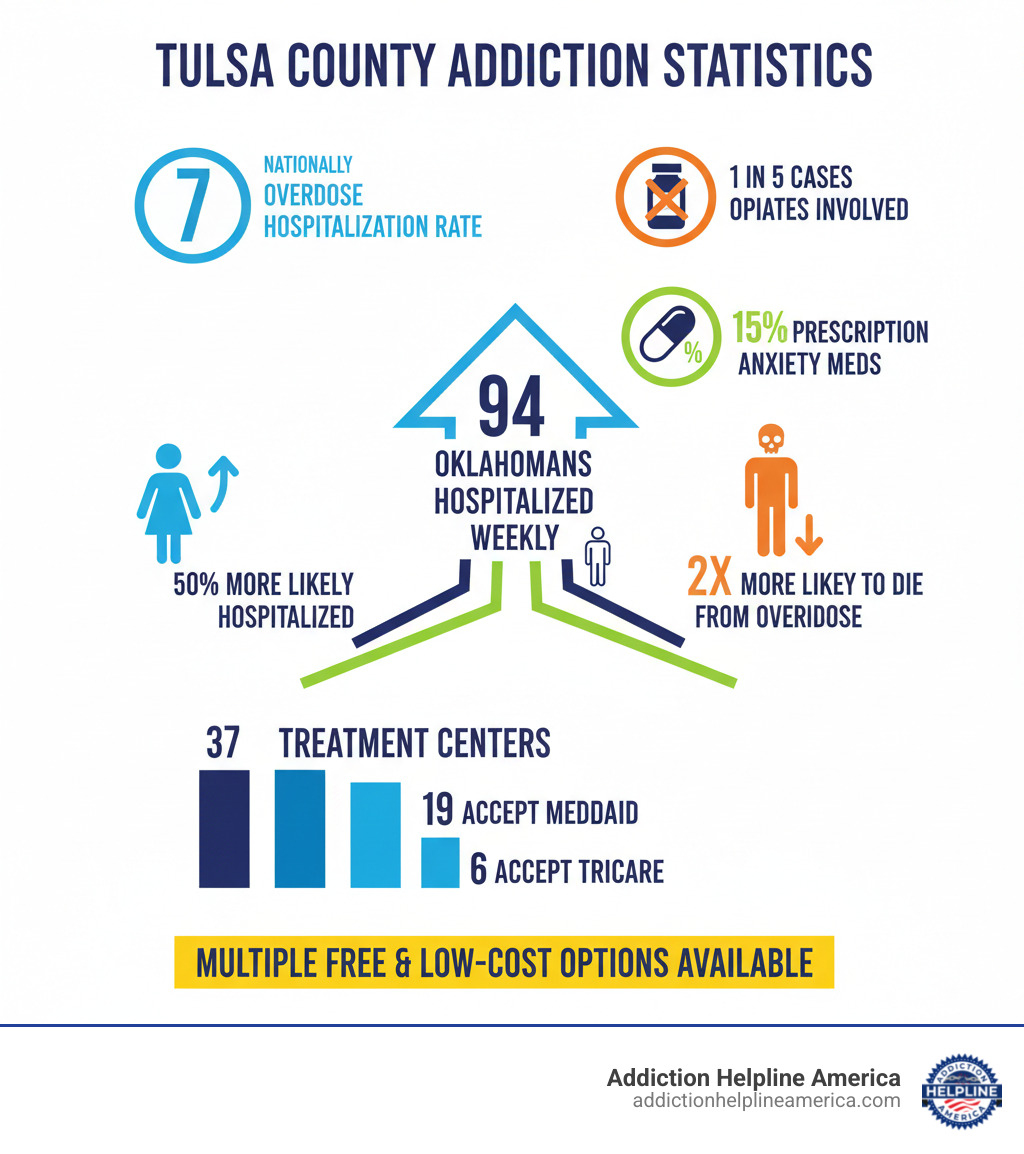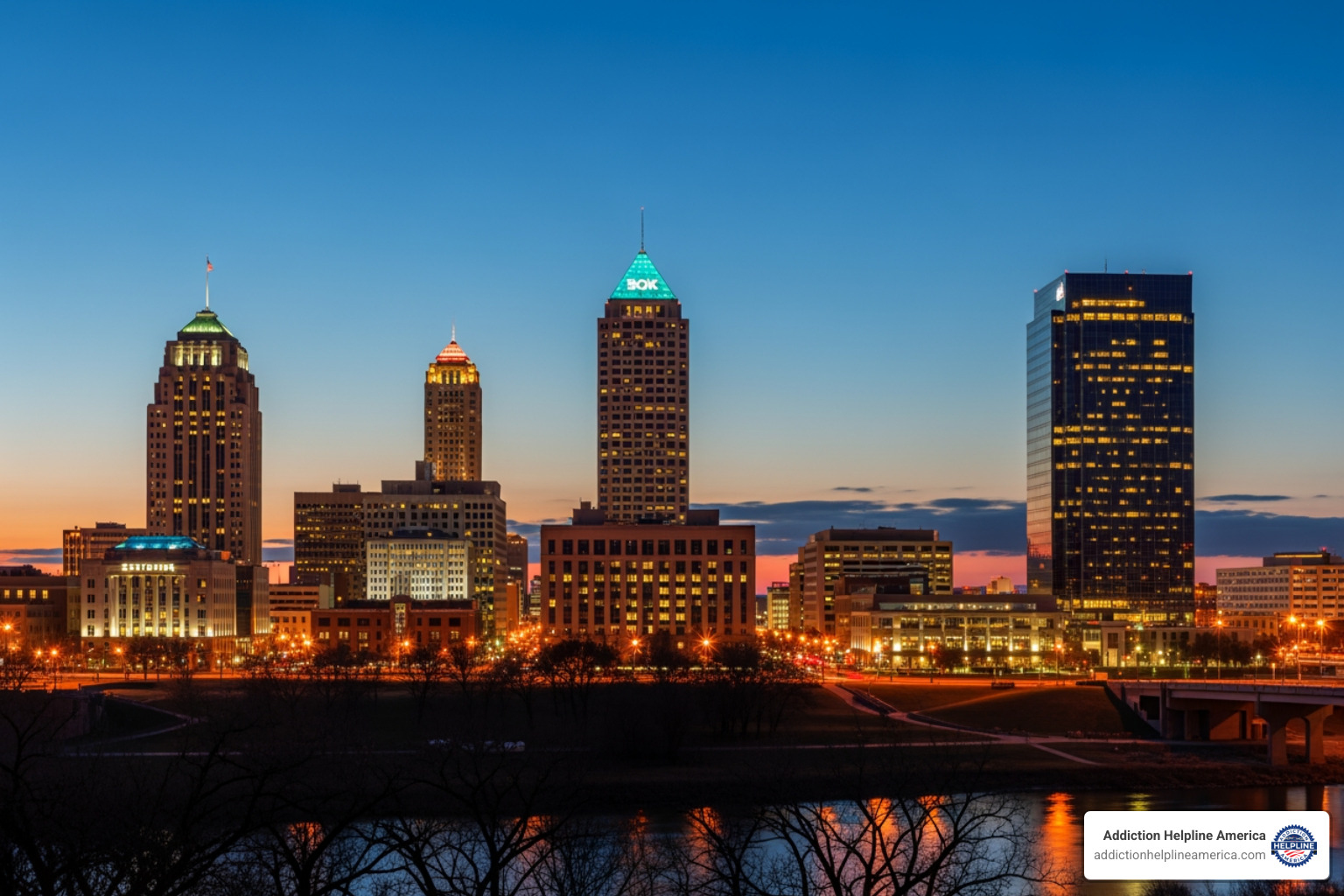
Understanding Your Options for Rehabs in Tulsa Oklahoma
Rehabs in tulsa oklahoma offer a lifeline for individuals and families facing addiction. If you’re seeking help, it’s important to know that a wide range of treatment options are available right here in your community.
The need for these services is urgent. In 2019, Tulsa County had the seventh-highest overdose hospitalization rate in the country. Opiates were involved in one in five cases, and about 94 Oklahomans are hospitalized for drug abuse weekly. While these statistics are sobering, they have spurred the creation of a robust network of support.
Tulsa is home to 37 addiction treatment centers, offering everything from medical detox and inpatient care to flexible outpatient programs (IOP). Many facilities provide specialized care for women, veterans, and Native American communities. Affordability is also a key focus, with 19 facilities accepting Medicaid, six accepting TRICARE, and even no-cost residential programs available.
At Addiction Helpline America, we specialize in connecting people with rehabs in tulsa oklahoma that fit their unique needs, insurance, and recovery goals. Our mission is to simplify your search and help you find the right path to recovery.
Easy rehabs in tulsa oklahoma glossary:
Understanding the Addiction Landscape in Tulsa
Tulsa faces significant challenges with substance abuse, but understanding the problem is the first step toward finding a solution. The statistics are stark: Oklahoma saw a 418% increase in drug overdoses in 2022, and residents are now more likely to die from an overdose than a firearm.
The Crisis in Tulsa County and the Response
Tulsa County has been an epicenter of this crisis, with the seventh-highest overdose hospitalization rate in the country in 2019. Every week, about 94 Oklahomans are hospitalized due to drug abuse. Opiates are a primary driver, responsible for one in five overdose cases, while prescription anxiety medications account for another 15%. The data also shows gender disparities: women are 50% more likely to be hospitalized for drug emergencies, while men are twice as likely to die from an overdose.
In response, Oklahoma has enacted crucial legal protections to support recovery:
- Mental Health Parity Laws: These laws mandate that insurance companies cover addiction treatment just as they would any other medical condition, improving access to rehabs in tulsa oklahoma.
- Good Samaritan Law: This law protects individuals from prosecution for minor drug offenses when they call 911 to report an overdose, encouraging people to save lives without fear.
- Opiate Prescription Regulations: State laws now require electronic prescription monitoring to prevent fraud and have increased the availability of Naloxone (Narcan), a medication that can reverse opioid overdoses.
- Court-Ordered Treatment: The legal system often provides a path to recovery through court-ordered rehab, offering an alternative to incarceration.
These measures, combined with the dedicated work of local treatment centers, create a supportive environment for anyone ready to seek help. For a broader look at options, visit our guide to Oklahoma rehabs.
Types of Addiction Treatment and Levels of Care in Tulsa
Recovery is not one-size-fits-all. The best rehabs in tulsa oklahoma offer a “continuum of care,” with different levels of treatment that can be custom to your needs. These programs use evidence-based therapies, often combined with holistic approaches, to create an individualized plan for your recovery.
Medical Detox: The First Step to Safety
For dependence on substances like alcohol, opioids, or benzodiazepines, recovery typically starts with medical detox. Withdrawal can be dangerous without medical supervision. Detox provides a safe environment with 24/7 monitoring and often uses medication-assisted treatment (MAT) to manage symptoms and cravings, ensuring you are physically stable before beginning therapy. Detox addresses physical dependence but is not a complete treatment for addiction itself.
Inpatient vs. Outpatient Programs
Choosing between inpatient and outpatient care is a key decision. The right choice depends on your specific situation.
- Inpatient (Residential) Care: You live at the facility full-time, receiving immersive therapy in a structured, trigger-free environment. This is ideal for severe addiction, unstable home situations, or co-occurring mental health disorders that require constant support.
- Outpatient Care: You live at home and attend scheduled treatment sessions, such as intensive outpatient (IOP) or partial hospitalization (PHP) programs. This option allows you to maintain work or family commitments and is best for those with a stable support system.
Our team can help you determine which level of care is right for you. Learn more about outpatient care options in Tulsa.
The Critical Role of Dual Diagnosis Treatment
Addiction often co-exists with mental health conditions like depression, anxiety, or trauma. This is known as a dual diagnosis. Treating the substance use without addressing the underlying mental health issue often leads to relapse. The most effective rehabs in tulsa oklahoma offer integrated treatment, where both conditions are addressed simultaneously by the same team. If you struggle with both, finding a program specializing in dual diagnosis is essential for lasting recovery. Find more information on our page for mental health services in Tulsa.
Finding Specialized Rehabs in Tulsa Oklahoma
Effective recovery programs recognize that every individual’s journey is unique. That’s why many rehabs in tulsa oklahoma offer specialized tracks custom to specific needs, ensuring you receive care that resonates with your life experiences.
Programs for Specific Populations and Conditions
Tulsa’s recovery community provides focused care for various groups and conditions:
- Demographic-Specific Programs: You can find dedicated programs for veterans (with several centers accepting TRICARE), women (including mothers with children), men, LGBTQ+ individuals, and young adults. Culturally sensitive care is also available for Native American communities through IHS-funded facilities.
- Substance-Specific Treatment: Centers offer specialized protocols for addictions to opioids (often using Medication-Assisted Treatment or MAT), alcohol, methamphetamine, and prescription drugs.
- Co-occurring Conditions: Many facilities specialize in dual diagnosis treatment, addressing addiction and mental health simultaneously. Trauma-informed care is also increasingly common, creating a safe environment to heal from past trauma that may fuel substance use.
Faith-Based and Alternative Therapies
For many, recovery involves more than clinical therapy. Tulsa rehabs also offer approaches that heal the mind, body, and spirit.
- Faith-Based and 12-Step: Many programs are built on the principles of 12-Step fellowships like Alcoholics Anonymous. Others offer faith-based tracks that integrate Christian teachings and spiritual guidance into the recovery process.
- Holistic and Alternative Therapies: To treat the whole person, many centers incorporate holistic methods. These can include yoga and meditation for mindfulness, art and music therapy for emotional expression, equine therapy to build trust and responsibility, and wilderness therapy that uses nature to foster resilience.
Finding a program that aligns with your personal background and beliefs can significantly improve your recovery experience.
Navigating the Cost of Rehab in Tulsa
The cost of treatment is a major concern for many, but it should not be a barrier to getting help. Rehabs in tulsa oklahoma offer a variety of payment solutions to make recovery accessible, and care in the area is often more affordable than state and national averages.
Understanding Treatment Costs and Payment Options
Treatment costs vary based on the level of care and program length. Here are the most common ways to pay:
- Private Health Insurance: Thanks to Mental Health Parity Laws, most insurance plans cover addiction treatment. In Tulsa, 13 facilities accept private insurance from major providers like Aetna, Blue Cross Blue Shield, and Cigna.
- Private Pay/Cash: For those without insurance, 14 facilities near Tulsa accept private pay. Many offer flexible payment plans to spread the cost over time.
For more details, Explore payment options for Tulsa rehabs.
Free and Low-Cost Rehabs in Tulsa Oklahoma
If you have limited financial resources, numerous high-quality, low-cost, and even free options are available.
- Medicaid and Medicare: A remarkable 19 rehab programs near Tulsa accept Medicaid, and many also accept Medicare, opening the door to treatment for many residents.
- State-Funded and Tribal Programs: Seven programs accept other state-funded insurance, and five facilities are funded through IHS/tribal resources for Native American individuals.
- Sliding Scale Fees: Many non-profit centers adjust their fees based on your income, ensuring you only pay what you can afford.
- No-Cost Programs: Some organizations, like The H.O.W. Foundation, offer completely free residential programs for men, proving that recovery is possible regardless of your financial situation.
Don’t let cost stop you from seeking help. To see what you qualify for, Learn about free and low-cost options in Tulsa.
How to Choose the Right Tulsa Rehab for You
Choosing a treatment center is a critical decision. The “best” rehab is the one that fits your specific needs, goals, and circumstances. Making an informed choice means looking beyond brochures and evaluating the factors that truly contribute to long-term success. You can start by exploring Tulsa rehab options to see what’s available.
Key Factors: Accreditation, Staff, and Philosophy
When evaluating rehabs in tulsa oklahoma, focus on these three core elements:
- Accreditation: This is a seal of approval indicating a facility meets high standards for safety and care. Look for credentials from respected bodies like The Joint Commission, CARF, and SAMHSA (Substance Abuse and Mental Health Services Administration). LegitScript certification is another mark of a reputable provider.
- Staff Qualifications: The quality of the clinical team is paramount. Ask about the credentials, experience, and specializations of the therapists and medical staff. A qualified and compassionate team is essential for effective treatment.
- Treatment Philosophy: Every center has a core approach. Does it focus on evidence-based therapies like CBT? Does it incorporate 12-Step principles, faith-based guidance, or holistic methods? Find a philosophy that aligns with your personal beliefs and recovery goals.
Evaluating Amenities and Patient Reviews for rehabs in tulsa oklahoma
While clinical quality comes first, the environment and experiences of past clients also matter.
- Amenities and Environment: A comfortable setting can support the hard work of recovery. Consider amenities like private rooms, fitness facilities, and outdoor spaces. The location—whether urban or rural—can also impact your experience. Some centers, like GRAND Addiction Recovery Center, offer community-focused amenities like a courtyard and workout room.
- Patient Reviews: Testimonials from former patients provide valuable insight into a facility’s culture, staff compassion, and program effectiveness. Look for consistent themes in reviews to get a sense of the real-life experience at a center.
Taking the time to research these aspects will help you choose a program where you feel safe, supported, and confident in your path to recovery.
Frequently Asked Questions about Rehabs in Tulsa
Navigating the path to recovery brings up many questions. Here are straightforward answers to some of the most common concerns about rehabs in tulsa oklahoma.
How long does addiction rehab in Tulsa typically last?
There is no set timeline for recovery. The length of treatment depends on your individual needs, the substance used, and the severity of the addiction. Common program lengths include:
- Short-term programs: Typically 30 days, focusing on stabilization and foundational skills.
- Long-term programs: 60, 90, or 120+ days. Research shows longer stays often lead to better long-term outcomes.
- Outpatient and Aftercare: These flexible programs can last for several months to a year or more, providing ongoing support as you transition back to daily life.
The right duration for you will be determined by a professional assessment.
Will I lose my job if I go to rehab?
No, you are protected. Federal laws like the Americans with Disabilities Act (ADA) and the Family and Medical Leave Act (FMLA) prevent employers from firing you for seeking treatment. The FMLA may allow you to take up to 12 weeks of unpaid, job-protected leave. Your decision to attend rehab is also confidential under HIPAA. Most inpatient programs require you to focus solely on recovery without work distractions, as your health is the top priority.
How do I pay for treatment if I don’t have insurance?
Lack of insurance should not stop you from getting help. Many affordable options exist:
- Medicaid: 19 rehabs near Tulsa accept Medicaid, making treatment accessible for low-income individuals.
- State-Funded Programs: Oklahoma provides funding for residents, and several local centers accept this coverage.
- Sliding Scale Fees: Many non-profits adjust costs based on your income.
- No-Cost Programs: Organizations like The H.O.W. Foundation offer free residential treatment for men.
- Payment Plans & Scholarships: Many facilities offer payment plans or have scholarships available. Always ask about financial assistance options.
Our team can help you steer these financial options to find a program that works for you.
Your Path to Recovery Starts Today
Taking the first step by seeking information is a courageous act. The journey to recovery is personal, but you don’t have to walk it alone. Healing is possible, and the right help is available.
Tulsa has a compassionate and diverse network of treatment centers. Whether you need medical detox, inpatient care, flexible outpatient services, or a specialized program, the right fit exists. From veteran-focused care to faith-based recovery, rehabs in tulsa oklahoma are equipped to help.
At Addiction Helpline America, our mission is to provide free, confidential, and personalized guidance. We know the local treatment landscape and can help you steer your options, from insurance coverage to program specializations. We cut through the confusion so you can focus on getting well.
Behind every statistic is a story of hope. Yours can be one of them. Your new chapter starts with a single decision to reach out.
Find the right Tulsa rehab program for you and let us connect you with the support you deserve.
Our helpline is 100%
free & confidential
If you or someone you care about is struggling with drug or alcohol addiction, we can help you explore your recovery options. Don’t face this challenge alone—seek support from us.
Programs
Resources
Will my insurance
cover addiction
treatment?
We're ready to help
Find the best
drug or alcohol treatment
center
Are you or a loved one struggling with addiction? Call today to speak to a treatment expert.

















